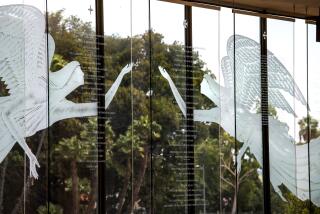‘We Can Come Together’
- Share via
Amid the pageantry of centuries-old traditions, three bishops and an elder from four major Christian denominations presided over a special ecumenical service Thursday evening at Mission Basilica San Juan Capistrano.
Episcopal Bishop J. Jon Bruno prayed that Christ would “make us attentive to your truth. Only in this way shall we be ready to hear what the spirit is saying to the churches today . . . and no longer provoke scandal by our divisions.”
A crowd of 500, including nearly 40 clergymen and clergywomen in liturgical attire, came to the basilica for the culmination of Christian Unity Week, an annual observance worldwide. Such efforts to reconcile the church have become a theme for many Christian denominations, some of which recently put aside 500 years of differences in the name of unity.
“Ecumenism doesn’t have the breathless passion that it did once upon a time,” said professor Marvin Meyer, chairman of religious studies at Chapman University. “But there is a widespread concern that if the churches are going to survive in this century and this millennium in a healthy kind of way, there’s a great need for discussion.”
The movement began at the beginning of the 20th century and experienced a revival in the mid-1960s after Catholic reforms enacted by the Second Vatican Council.
“There used to be a thrill that perhaps we can get together and believe the same things” and be a single church, Meyer said. “Now there’s less interest in that and more interest in finding out what we do have in common, what ways we can come together.”
At the basilica, Bruno, Catholic Bishop Tod D. Brown, Lutheran Bishop Murray Finck and Presbyterian elder Jane Odel each officiated over a part of the emotional service. Singers from five churches formed a single choir, and liturgical dancers performed in the aisles. Near the end of the service, the congregation and clergy joined hands for a final prayer.
“As our prayer for Christian unity draws toward its close,” Brown said, “we join hands with those nearest to us to show our commitment to seek daily in this newly begun millennium that perfect unity which the Lord desires for those who are his own.”
In Orange County, a record six denominations (Catholic, Orthodox, Episcopal, Lutheran, Presbyterian and Methodist) took part in the planning of unity events, which included a concert and a panel discussion on ecumenism.
The local unity push gained momentum in 1998 when Brown, an influential religious figure with a flock of 1 million Catholics in Orange County, was elected chair of the National Conference of Catholic Bishops’ Ecumenical and Interreligious Affairs Committee. The bishop assigned a priest full time to coordinate ecumenical and interfaith activities in Orange County.
Ecumenism, which emphasizes cooperation among churches, differs from interfaith efforts, which promote understanding among religions.
Church unity has made uneven progress in recent years, though two groundbreaking accords were signed last year. The first allowed the Evangelical Lutheran Church and Episcopal Church to share clergy and communion services. The first joint service between the two denominations in Orange County was earlier this month in Seal Beach.
Last October, the Roman Catholic Church and Lutheran World Federation took a step toward unity by settling a 500-year-old theological feud about how sinners are saved, a rift that led to the Reformation. The churches agreed that believers are saved by faith alone, though good works are evidence of faith.
Earlier this week, 175 people crowded into Tustin Presbyterian Church to hear a panel of clergy and scholars discuss how Christian churches can unite.
“Unity is best seen in the personal friendship we each have with Jesus Christ,” said the Rev. Bradford L. Karelius, rector of Santa Ana’s Episcopal Church of the Messiah. “[We need the] grace to live with questions that can’t be answered with certainty.”
Unity is important, said Mark Roberts, senior pastor of Irvine Presbyterian Church, because it is an “essential part of the work Christ has done and chief evidence that the Scriptures are true.”
The Rev. Thomas Rausch, a professor in the Loyola-Marymount theology department, said ecumenism might be viewed as a “gift exchange” between Christian denominations so that differences can be seen as positive.
But the Rev. Steve Beckham of Our Savior’s Lutheran Church in Orange said, “We’re afraid of each other.” Fear between denominations, he said, has caused an “us-versus-them” attitude.
“The brilliance of Jesus is that he says there is no ‘them,’ ” Beckham said.
More to Read
Sign up for Essential California
The most important California stories and recommendations in your inbox every morning.
You may occasionally receive promotional content from the Los Angeles Times.













